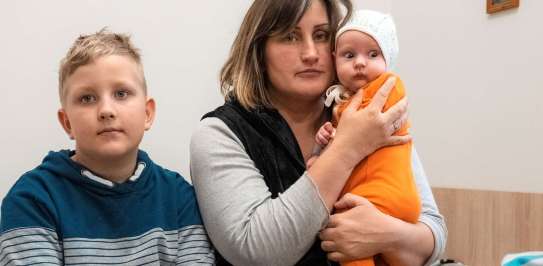In the past year, the invasion of Ukraine has destroyed homes, torn families apart and stolen the rights of people to lead their own lives.
With nearly £10 million in funds raised through the DEC appeal, Christian Aid has responded by delivering emergency assistance to over 770,000 people affected by the war in Ukraine.
We've been working with partners to provide hope and to ensure people survive and rebuild. Here are some stories from those impacted.
Image credits and information

One year ago, everything was going to plan for Dima. He had just turned 18 and was preparing for a long career in football. But his plans, like so many others, were shattered by the war.
'…a missile finally hit our house and smoke filled the basement. We had to run out into the open, fearing for our lives, artillery shelling all around. It was the worst day of my life. It was then that I decided to leave no matter what. Life in Mariupol after the start of the war became horrible.'
Dima knew couldn't stay in Ukraine. Together with his girlfriend Anna the two embarked on their journey to leave. Dima had a friend who fled to Budapest in the first days of war. But it was also after contacting a famous Russian vlogger Yury Dud, who suggested they reach out to András from the Hungarian Interchurch Aid (HIA), did they decide that Budapest would be their final destination.
'[András] reassured me we would be getting accommodation and three meals a day from HIA. And he was right – I ended up staying with HIA from April to July. During that time, I started working nightshifts in a warehouse.'
A year later, Dima is now now 19 years old, lives in a smaller town, Székesfehérvár, some 60 kilometres to the south-west of Budapest, and his old dream of playing “the beautiful game” resurfaced.
'Hungarian Interchurch Aid found a football club which was ready to take me on, despite me not being in great physical shape because by then I hadn’t played football for more than six months because of the fighting. The club’s management was very understanding - they took me on. This is how I ended up in MOL Fehérvár FC.'
As he works towards his goals, there are still many thoughts that trouble him. With fighting continuing in the second year of the war, he thinks an easy peace was never an option. Despite this, he is hopeful:
'I hope that with God’s help the war will end by summer and that we will live in a free country, without war and free from occupation with European values. I hope that we will rebuild Ukraine and everything will come right.'
Image credits and information

‘Like the majority of Ukrainians, I started getting phone calls at 4am from my friends who were saying: “get up, the war has started.” It was horrible, I was very scared as we heard the first air raids and explosions. Horror is the only thing I remember about that day.’
Lyuba stayed into Dnipro until mid-March, helping out in a centre her church opened for the first wave of refugees from the Kharkiv and Zaporizhya regions. But after learning about the opportunity to evacuate to the Transcarpathian region in Western Ukraine in March, she took it. As she left, her father advised her to take her bandura, so if she ended up with nothing she could still busk.
‘I stayed with a very kind and hospitable family in a village there... Then, in May, I learnt of the Hungarian charity HIA, Christian Aid partner, and registered with them…They supported me financially. As a student, I did not have any means. I could not ask my parents for helps as they were living under occupation and banks did not work there…’
By the end of August, Lyuba moved to Lviv in western Ukraine and once again to return to Dnipro to complete her studies. She met other Christians who were actively involved in charity work and began working with them.
‘We staged performances in the city centre. I played bandura and sang patriotic songs to raise people’s morale…We toured the region with performances, I played bandura a lot.
‘The reaction is abundant. People do react to my songs. They cry, too. They become very emotional. They all want peace and victory.’
As the first anniversary of the war draws close, Lyuba reflects:
‘It is all very difficult. When it all started, there was hope that it would end in a week or two. And then a month passed, another… Still there was hope that it will just come to an end. We must hope, we must pray. I do believe that God will help us and victory will be ours.’
We are inviting churches across Britain and Ireland to join together in an act of witness to pray for Ukraine on Sunday 26 February, for an end to the conflict and for all those affected by the terrible impact of war.


